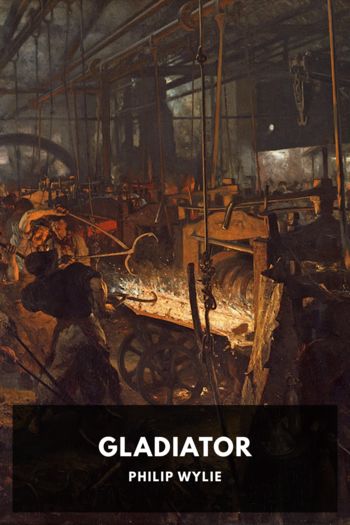Gladiator - Philip Wylie (readnow .TXT) 📗

- Author: Philip Wylie
Book online «Gladiator - Philip Wylie (readnow .TXT) 📗». Author Philip Wylie
“Nice work in the game last week. Pretty.”
“Thanks.”
“Woodie says you’re the best man on the team. Glad you went Psi Delt. Best house on the campus. Great school, Webster. You’ll love it.”
“Sure,” Hugo said.
The railroad coach was twisting and writhing peculiarly. Hugo suddenly wanted to be in the air. He hastened to the platform of the car and stood on it, squinting his eyes at the countryside. When they reached the Grand Central Terminal he was cured of his faintness. They rode to the theatre in an omnibus and saw the matinée of a musical show. Hugo had never realized that so many pretty girls could be gathered together in one place. Their scant, glittering costumes flashed in his face. He wanted them. Between the acts the fraternity repaired in a body to the lavatory and drank whisky from bottles.
Hugo began to feel that he was living at last. He was among men, sophisticated men, and learning to be like them. Nothing like the camaraderie, the show, the liquor, in Indian Creek. He was wearing the suit that Lefty Foresman had chosen for him. He felt well dressed, cool, capable. He was intensely well disposed toward his companions. When the show was over, he stood in the bright lights, momentarily depressed by the disappearance of the long file of girls. Then he shouldered among his companions and went out of the theatre riotously.
Two long tables were drawn up at the Raven, a restaurant famous for its roast meats, its beer, and its lack of scruples about the behaviour of its guests. The Psi Deltas took their places at the tables. The dining-room they occupied was private. Hugo saw as if in a dream the long rows of silverware, the dishes of celery and olives, and the ranks of shining glasses. They sat. Waiters wound their way among them. There was a song. The toastmaster, a New York executive who had graduated from Webster twenty years before, understood the temper of his charge. He was witty, ribald, genial.
He made a speech, but not too long a speech. He called on the president of a bank, who rose totteringly and undid the toastmaster’s good offices by making too long a speech. Its reiterated “dear old Websters” were finally lost in the ring and tinkle of glassware and cutlery.
At the end of the long meal Hugo realized that his being had undergone change. Objects approached and receded before his vision. The voice of the man sitting beside him came to his ears as if through water. His mind continually turned upon itself in a sort of infatuated examination. His attention could not be held even on his own words. He decided that he was feverish. Then someone said: “Well, Danner, how do you like being drunk?”
“Drunk?”
“Sure. You aren’t going to tell me you’re sober, are you?”
When the speaker had gone, Hugo realized that it was Chuck. There had been no feeling of recognition. “I’m drunk!” he said.
“Someone give Danner a drink. He has illusions.”
“Drunk! Why, this man isn’t drunk. It’s monstrous. He has a weakened spine, that’s all.”
“I’m drunk,” Hugo repeated. He knew then what it was to be drunk. The toastmaster was rising again. Hugo saw it dimly.
“Fellows!” A fork banged on a glass. “Fellows!” There was a slow increase in silence. “Fellows! It’s eleven o’clock now. And I have a surprise for you.”
“Surprise! Hey, guys, shut up for the surprise!”
“Fellows! What I was going to say is this: the girls from the show we saw this afternoon are coming over here—all thirty of ’em. We’re going up to my house for a real party. And the lid’ll be off. Anything goes—only anybody that fights gets thrown out straight off without an argument. Are you on?”
The announcement was greeted by a stunned quiet which grew into a bellow of approval. Plates and glasses were thrown on the floor. Lefty leaped on to the table and performed a dance. The proprietor came in, looked, and left hastily, and then the girls arrived.
They came through the door, after a moment of reluctant hesitation, like a flood of brightly colored water. They sat down in the laps of the boys, on chairs, on the edge of the disarrayed tables. They were served with innumerable drinks as rapidly as the liquor could be brought. They were working, that night, for the ten dollars promised to each one. But they were working with college boys, which was a rest from the stream of affluent and paunchy males who made their usual escort. Their gaiety was better than assumed.
Hugo had never seen such a party or dreamed of one. His vision was cleared instantly of its cobwebs. He saw three boys seize one girl and turn her heels over head. A piano was moved in. She jumped up and started dancing on the table. Then there was a voice at his side.
“Hello, good-looking. I could use that drink if you can spare it.”
Hugo looked at the girl. She had brown hair that had been curled. Her lips and cheeks were heavily rouged and the corners of her mouth turned down in a sort of petulance or fatigue. But she was pretty. And her body, showing whitely above her evening dress, was creamy and warm. He gave the drink to her. She sat in his lap.
“Gosh,” he whispered. She laughed.
“I saw her first,” someone said, pulling at the girl’s arm.
“Go ’way,” Hugo shouted. He pushed the other from them. “What’s your name?”
“Bessie. What’s yours?”
“Hugo.”
The girl accepted two glasses from a





Comments (0)